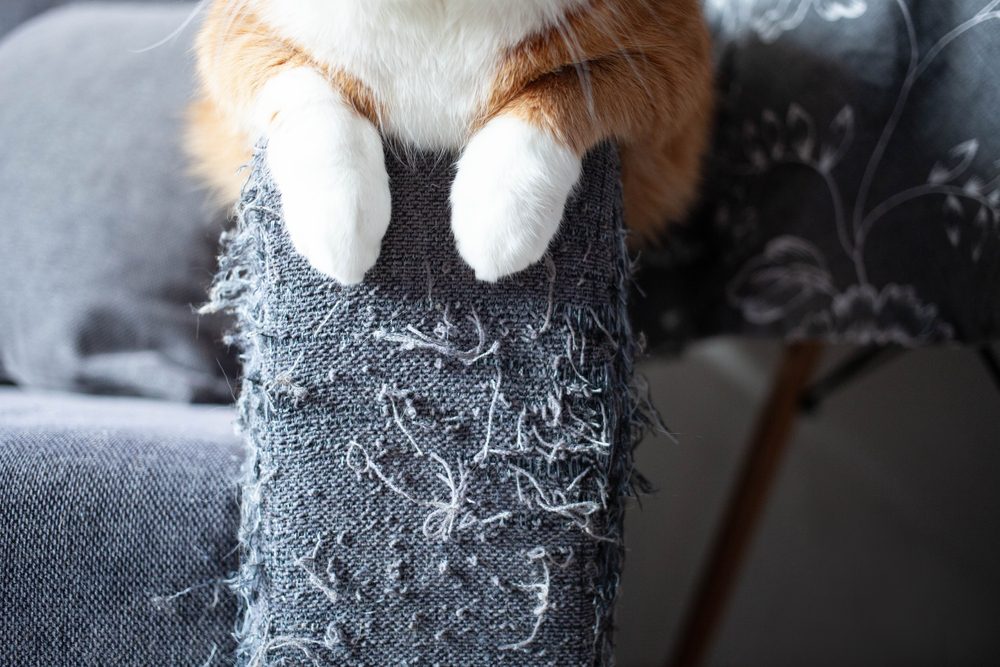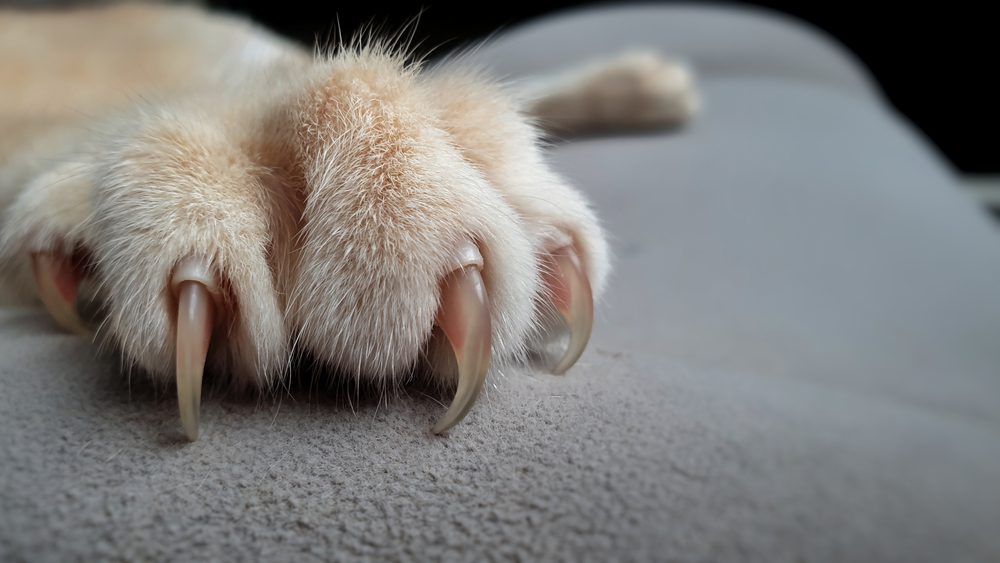Cats scratch. That’s definitely a fact. The secret is to do something about it as soon as you see your cat scratching your furniture. If you let it get out of control, it will turn into a real nightmare. This article will help you stop your feline from scratching your couch, carpets, and even you!
One of the most common things people complain about when it comes to their cats is that they scratch objects around the house. It’s very frustrating to come home only to find your lovely chair or couch ruined by your cat’s claw. Fortunately, there are some things you can do to keep your feline’s cute little paws off your furniture.
Let’s get started!

Why Do Cats Scratch Furniture?
Cats like to scratch furniture for several reasons. Some do it to keep their claws healthy and stretch their muscles. Others do it as a way to put their own personal scent on objects, marking their territory. And there are some cats that scratch simply because they enjoy doing that!
Also, some felines scratch furniture when they are anxious or stressed. If your cat is scratching stuff around your house more than usual, it may indicate that something’s bothering her or him. It’s important to determine the reason why your cat is doing that in the first place so you can take action and do something that will help your cat stop.
Whatever the reasons for these furniture-scratching habits, it’s essential to make your cat stop. Not only does scratching make your furniture look ugly, but it can also damage it. Not to mention that it can also be painful if you’re the one that gets scratched.
Here are some ways to stop your feline from scratching your furniture!
1. Keep Your Cat From Getting Bored
One of the reasons your cat is scratching your furniture is that they are stressed or bored. Make sure your cat gets plenty of toys and playtime, and you’ll keep their minds occupied. A great idea that seems to help many cat owners is buying a cat tree. This life-saving object is very useful, as it will keep your feline entertained. This means that they will no longer be so tempted to get into your carpets, couch, and curtains.
It doesn’t necessarily have to be a cat tree; any other climbing structure should be just fine. If you give them different activities and toys, they will also be much more likely to be happier and have fun. But most importantly, it will reduce undesirable behaviors like scratching your furniture.
Don’t forget to also keep your cat active. Play with her or him as often as possible. It will keep them healthy and happy.
2. Provide an Acceptable Scratching Surface
I’ve already mentioned the reasons cats scratch things. In fact, it’s pretty unlikely to have a cat who doesn’t like scratching. Therefore, one way to discourage them from doing this is to offer them plenty of other objects to scratch.
Basically, scratching comes as second nature to cats, so it’s kind of impossible to make your feline stop being a… cat! So, a great idea would be to provide your cat with something that’s okay to scratch. Scratching posts and cat trees are obviously perfect for this purpose, but you can also use cardboard boxes, blankets, or towels rolled up tightly, or even an old piece of carpeting.
Some cats may not be using the scratching posts you’ve provided, so an idea would be to make them more appealing. This could mean placing them in strategic spots around the house or adding a little catnip.
3. Use Cat-Friendly Deterrents
If you’ve already done the things listed above and your cat’s still scratching your couch or other furniture, don’t fret! I have a few more ideas! One would be to use cat-friendly deterrents.
Aluminum foil or double-sided tape are two homemade alternatives. Use them on the sports you don’t want your feline to scratch. Some cat owners also recommend rubbing the specific areas with some orange or lemon peel. However, this may not smell great to some people.
Other people recommend using a homemade spray, but I’ve read some reviews on the Internet, and no matter what you’re mixing into it, it won’t stop your car from scratching your furniture. Not to mention that most homemade sprays used as cat-friendly deterrents tend to give off an unpleasant smell.

4. Trim Your Cat’s Nails Regularly
One of the most effective methods that will make your cat stop scratching your furniture is one that implies keeping their nails trimmed. You can either do this yourself at home using a pair of pet nail trimmers, or you can take your cat to a vet or groomer for professional nail trimming.
Pay attention to your cat and try to figure out how often he or she scratches stuff around your house. Depending on that, you may need to trim their nails once every couple of weeks or so.
Consider getting scissors, nail clippers, or a grinder to help you do this nail-trimming process more easily at home. Here are a few options:
- Nail clippers: it’s important to choose a nail clipper that’s suitable for your cat. There are some universal nail clippers that work great for any cat, no matter their size or stage of life. Choose one that has sharp and effective clippers, and both you and your feline will have an easier experience during a nail-trimming session.
- Nail scissors: they are the perfect way to quickly and efficiently trim your cat’s nails. Whatever brand you choose, make sure the scissors are sharp, comfortable, and resistant to rust.
- Nail grinders: they are an easy-to-use cordless tool that is ideal for both cats and dogs. It’s small enough to easily fit in the palm of your hand, but effective enough to get the job done on even the most stubborn of nails. Here’s one I’ve been using for two years.
5. Reduce Stress in Your Cat
A stressed kitty is far more likely to scratch carpets and couches, urinate outside the litter box, or exhibit other destructive behaviors. One way to reduce stress in your cat’s life is to create a comfortable space for them.
As any cat owner knows, felines are creatures of habit. A cat will always like things to be just so; therefore, any change in their routine can be disturbing. It’s especially essential to maintain a comfortable area and routine if your cat suffers from anxiety.
This being said, it’s important for your cat to feel secure and safe. When they feel safe, they are much less likely to engage in furniture-scratching habits. But how exactly do you do that?
The first thing you have to do is pick the right spot. Your kitty’s comfort zone should be somewhere quiet, away from any foot traffic. Also, make sure this location is not shared with other pets in the home. For instance, a spare room or office is always a great idea.
Also, it’s important that the spot is properly equipped. It should have all the essentials, including food and water bowls, a litter box, bedding, scratching posts, and toys. It’s also a great idea to incorporate some of your cat’s favorite objects, like a toy or a soft blanket.
Another thing you should do is create hiding spots. Cats feel especially safe when they have spots to hide. Provide them with a few covered pet beds or cardboard boxes that they can use when they feel overwhelmed.
Finally, make sure you keep the spot clean and tidy. A clutter-free and clean location will help your cat feel more relaxed. This included scooping the litter box daily and wiping down any surface as needed.
Another way to reduce stress in your cat is by using pheromone products. These are chemicals that are known to relax cats, and you can find them at most pet stores or buy them online. Make sure to choose a product that is clinically proven.
It’s highly necessary to also give your cat plenty of attention. Kitties are social creatures; therefore, they need interaction with their owners to stay happy and healthy. Make sure you spend time playing with and petting your cat every day. This will help your feline feel loved and stimulated, which can reduce stress and anxiety that can lead to furniture scratching.
6. Consider Behaviour Modification
There are situations where behavior modification may be necessary to make your cat stop scratching furniture. This can effectively be done through positive reinforcement, like rewarding your kitty when they dig their claws into an appropriate surface, or negative reinforcement, like hissing at them when they scratch carpets, rugs, or couches.
If your cat has a habit of scratching you, make sure you always have a fun toy nearby that you can redirect your cat to. Talk to a qualified animal behaviorist to find the best approach for your cat.

7. Reward Your Kitty When He/She Doesn’t Scratch
If your cat doesn’t have furniture-scratching habits, be sure to give them plenty of attention and love. Let them know that they are doing a good job! Last but not least, have patience and keep rewarding your feline for good behavior.
What NOT To Do
Don’t Declaw Your Cat
Something you should never do is declaw your cat. It’s a pretty cruel practice that doesn’t help you solve the root of the issue: why they are scratching in the first place. Moreover, while declawing may seem like a basic procedure, it’s actually pretty complicated and can result in pain for your kitty, both during the surgery and afterward.
That’s because declawing isn’t just permanently removing the cat’s nails. It’s actually a procedure that involves surgically amputating the last joint of each toe. Your kitty uses their claws for balance as well as to help them stretch their muscles. Therefore, removing them can result in a host of physical issues, including arthritis, joint pain, and mobility problems. Moreover, since declawed cats frequently can’t use their claws to defend themselves, they can become more aggressive or bite more often.
To sum this up, please don’t declaw your cat. There are more effective and much kinder ways to stop your cat’s scratching-furniture habits.
Don’t Use Punishment
Another thing you should avoid is using punishment as a way to make your feline stop ruining things around your house. This will only serve to stress them out, which could result in other behavioral issues. Plus, it probably won’t solve the issue since kitties don’t really respond well to punishment.
You may also want to read 14 Secrets Your Veterinarian Won’t Tell You.











